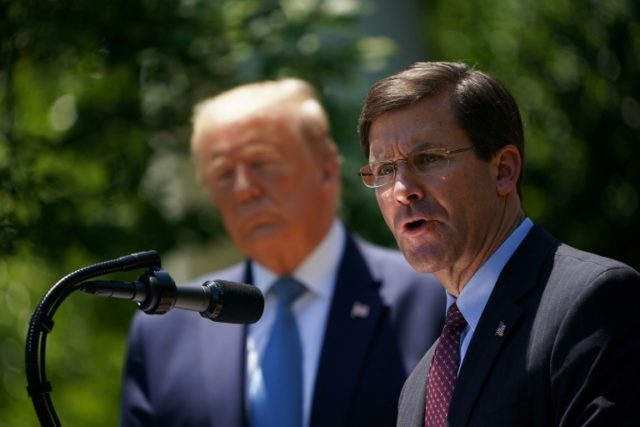Former U.S. Secretary of Defense Mark Esper implied in a new book former Israeli Prime Minister Benjamin Netanyahu pressured then-President Donald Trump to launch a military strike against Iran.
Quotes in his book, A Sacred Oath: Memoirs of a Secretary of Defense During Extraordinary Times, were redacted after the Department of Defense prohibited their publication.
Esper is suing the Pentagon with the claim “significant text is being improperly withheld from publication … under the guise of classification.”
According to Esper, Trump did not want to enter a war with Iran, but added “The president often had others in the room, and foreign leaders like Israeli Prime Minister Benjamin Netanyahu, telling him [REDACTED].”
Esper then writes: “Netanyahu would say this to me when I met with him, so I was confident he was telling Trump the same thing.”
“In my view, that seemed like a big bet to take, especially when there wasn’t a pressing need to take it anytime soon,” Esper continued.
More redacted paragraphs follow.
Netanyahu was also reported to have pressured Trump to hit Iran after it was clear he had lost the 2020 election, General Mark Milley, the chairman of the U.S. Joint Chiefs of Staff, was cited as saying in a report by the New Yorker.
“If you do this, you’re gonna have a fucking war,” Milley reportedly warned Trump at one point.
Journalists Susan Glasser and Peter Baker are set to release more details in an upcoming book.
Esper writes that in the months leading up to the January 2020 assassination of elite Revolutionary Guards general, Qassem Soleimani, “there was still a palpable sense that too many around the table wanted to strike Iran.” Esper writes.
Even in the months following the assassination, officials urged a strike. Then-National Security Advisor Robert O’Brien was “pushing for [REDACTED] and military action” during a July 2020 meeting. Then-Vice President Mike Pence was “subtly leaning in behind him, also seeming to support some type of action.”
Esper writes O’Brien claimed “the president has an appetite to do something” and later seemed to compromise, instead advocating a “a strike on senior Iranian military officer who was operating outside of Iran.”
“This was a really bad idea with very big consequences,” Esper writes.
Esper refused to conduct such an operation without a written order from Trump. “There was no way I was going to unilaterally take such an action – particularly one fraught with a range of legal, diplomatic, political and military implications, not to mention that it could plunge us into war with Iran,” he outlines.
The strike on the Iranian officer was “the last time something involving Iran seriously came up before the election.”
Shortly after, Trump tweeted “any attack by Iran, in any form, against the United States will be met with an attack on Iran that will be 1,000 times greater in magnitude!”
Trump fired Esper immediately after the November 2020 election, amid a disagreement involving the deployment of troops against Black Lives Matter protesters.

COMMENTS
Please let us know if you're having issues with commenting.